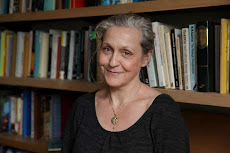In fact, we have a whole bookcase dedicated to them. Unsavoury, socially undesirable, rotten-to-the-core dirty words. I want my children to read them. ALL OF THEM.
Prompted - not by the recent kerfuffle over 'let's disappear the word woman on the grounds that it discriminates against intersex and transgender men' but by Daughter Number One's discovery of the gender stereotyping implicit in the English Department GCSE Language class.
In Daughter's English Language class - of all places - we discover that no-one bothers much about peddling ideas such as girls have good technical skills in painting their nails, adoring Barbie dolls, and putting ickle circles over their ickle letter i.
In this household, this woman-at-keyboard has long held the view that English departments should be about educating your critical thinking about language. Better than being an unquestioning purveyor of the worst kind of it.
Entirely co-incidental then, that I hear a kerfuffle today over whether we should be pregnant women or pregnant people.
Back to source, here is the paragraph in the British Medical Association's A guide to effective communication: inclusive language in the workplace
Pregnancy and maternity Gender inequality is reflected in traditional ideas about the roles of women and men. Though they have shifted over time, the assumptions and stereotypes that underpin those ideas are often deeply rooted. It is common to assume a woman will have children, look after them and take a break from paid work or work part-time to accommodate the family. If a woman is forgetful during pregnancy, this is often referred to as her ‘baby brain’. However, such assumption and stereotypes can and often do have the effect of seriously disadvantaging women. A large majority of people that have been pregnant or have given birth identify as women. We can include intersex men and transmen who may get pregnant by saying ‘pregnant people’ instead of ‘expectant mothers’.
A bit of rag-bag paragraph with a tagged-on sentence which reads, 'Hey! We at the BMA are so on-trend, it hurts!'
Quite right it hurts. The BMA can't talk here about the social or structural issues which give rise to our language, so it goes after the easier target, which is the language itself. There is naive thinking here, is there not? Train staff to say the right words. Because if we change the language, then we change the structural issues!
Me, I'm with Germaine Greer. We need more language, not less of it. Add some new words to the lexicon instead.
And to my own daughters, you choose whether you become a woman or a person. But your mother instructs you: Read the dirty books first.
Thursday 2 February 2017
Subscribe to:
Post Comments (Atom)




No comments:
Post a Comment